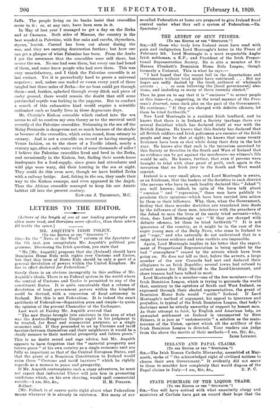THE ARREST OF SINN FEINERS.
[To THE EDITOR or THE " SPECTATOR."] Sri,—All those who truly love Ireland must have read with pain and indignation Lord Monteagle's letter in the Times of February 5th. Lord Monteagle is a most respectable Anglo- Irish nobleman, a K.P., and President of the Irish Propor- tional Representation Society. He is also a member of Sir Horace Plunkett's Dominion Home Rule League, though formerly a Unionist. This is what he says :-
" I had hoped that the recent lull in the deportations and internments without trial might have continued. . . . But my hopes are sadly dashed by the fresh outburst of wholesale arrests . . . so soon following the [local government] elec- tions, and including so many of those recently elected."
Then he goes on to say that it is " ominous " to arrest people at this time—i.e., suggesting, in the usual manner of the Free- man's Journal, some dark plot on the part of the Government. He continues : " If they are charged with definite offences, let them be tried forthwith."
Now Lord Monteagle is a resident Irish landlord, and he knows that there is in Ireland a Society (perhaps there are several Societies) which has declared itself at war with the British Empire. He knows that this Society has declared that all British soldiers and Irish policemen are enemies of the Irish people and may be shot at sight; he knows that some twenty Irishmen have been so shot while doing their duty in the last year. He knows also that such is the terrorism exercised by this Society or Societies in the South and West of Ireland that no evidence can he got against the murderers—no witness's life would be safe. He knows, further, that even if persons were brought to trial with clear proof of guilt, such again is the terrorism that no Irish jury in the South and West would convict. •
Ireland is a very small place, and Lord Monteagle is aware, as an Irishman, that the leaders of the Societies in each district (the persons who have in each locality declared this "Jehad ") are well known; indeed, in spite of the loose talk about " coercion " and " repression," these men have publicly to proclaim their opinions—which have been carried into action by them or their followers. Why, then, when the Government, finding that these murder doctrines are translated into deeds by the followers of these men, interferes with the preachers of the Jehad to save the lives of its sorely tried servants—why, then, does Lord Monteagle say : " If they are charged with definite offences, let them be tried forthwith "? It is not ignorance of the country, as it might be in the case of the eager young men of the Daily News, who come to Ireland to get " copy," and who naturally do not understand that in a reign of terror evidence and true verdicts are impossible.
Again, Lord Monteagle implies in his letter that the experi- ment of Proportional Representation is being spoiled by the bad " atmosphere " caused by the arrests which have been going on. He does not tell us that, before the arrests, a large number of the new Councils had met and declared their allegiance to an Irish Republic; several towns had refused to submit names for High Sheriff to the Lord-Lieutenant, and sheer treason had been talked in most.
Lord Monteagle is a member—one of the few members—of the Irish Dominion League, which is trying to persuade the world that, contrary to the opinions of South and West Ireland, as expressed through their elected representatives, the grant of Dominion Home Rule would "settle" Ireland. If Lord Monteagle's method of argument, his appeal to ignorance and prejudice, is typical of the Irish Dominion League, that body's doctrines must be utterly unworthy of support by honest men. As their attempt to foist, by English and American help, an unwanted settlement on Ireland is unsupported by Sinn Feiners, it is just as " undemocratic " a solution as the main- tenance of the Union, against which all the artillery of the Irish Dominion League is directed. Your readers can judge from the above the merits of their methods.—I am, Sir, Sic.,
IRISH LOYALIST.


































 Previous page
Previous page